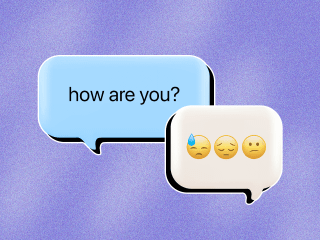How to Make Long-Distance Friendships Less Awkward
Taco Tuesdays won’t be the same, but you’ll find a new groove.
If coordinating a group hang suddenly involves a sprawling text thread, a shared Google calendar, and someone who’s great at finding flights, you’re not alone. Welcome to the tricky business of long-distance friendships. The past few years had a lot of people going through some major moves thanks to the pandemic and the wild housing market. So whether it was you who moved or a friend (or, uh, several friends), your core group of local friends might look a lot different these days, and that can be surprisingly rough to deal with.
“One theme I hear in my work on friendship is that people are often caught off guard when it comes to both the complexity and intensity of their emotions related to long-distance friendships,” says Miriam Kirmayer, PhD,, a clinical psychologist and friendship researcher who is also a member of Wondermind’s Advisory Committee. “We talk a lot about how challenging long-distance romantic relationships can be, and we don't do enough to normalize how difficult it can be to maintain a long-distance friendship, both practically and emotionally,” Kirmayer says.
Some of those emotions are more surprising than others, but the intensity of your feels when a friendship goes from local to long distance is usually what surprises people.
Let’s talk about the range of emotions that comes with this transition.
You’re gonna feel anxiety, especially “anticipatory anxiety,” which is super common leading up to a big change or separation that involves uncertainty, says Dr. Kirmayer. You might spiral over stuff like how often you'll see each other and whether the distance will make you grow apart. And you may feel hella anxious about the need to make new friends nearby now that you’re physically losing one. Another wave of anxiety could come when the emotional distance actually kicks in, especially if you feel like you don’t really know what to say to your friend anymore or how to connect with them in this new version of your friendship.
Then there’s the inevitable sadness. “I think that many people expect to be a little sad when a friendship that was once local becomes long distance, but I want people to know that it’s OK if you’re way more than a little sad and to not be surprised if you find yourself really down,” says Joy Harden Bradford, PhD, a clinical psychologist, host of the platform and podcast Therapy for Black Girls, and author of the forthcoming book Sisterhood Heals.
Part of being able to move through your sadness is allowing yourself to actually grieve the loss of having your friend nearby, says Dr. Kirmayer. Then, try to approach the situation with as much openness and curiosity you can muster, which can get you out of a place of grief and into a place of excitement about the new experiences and memories you’ll create in this next chapter of your friendship.
Envy and jealousy can also sneak in, says Dr. Kirmayer. You might feel legit jealous when your friend starts making new friends in their new city. Or envious when a friend’s move is connected to an experience you want for yourself, like a new job, buying a house, getting married, having a baby, or even traveling and exploring the world, which you may not be able to do on that scale right now.
The trickiest part is that all of these not-fun emotions can unfold against your genuine happiness and excitement for your friend’s journey. We can also experience a sense of relief when a friend moves away if we felt a bit of ambivalence about the friendship itself. “A bit of separation can sometimes help us to set or reset boundaries that allow us to continue connecting in healthy ways,” Dr. Kirmayer says.
So, how do you actually navigate all of these tough and sometimes conflicting feels? We asked the experts for some tips and advice for making long distance friendships feel less awkward.
1. Talk about the move before it happens.
“One of the biggest mistakes I see friends make is to wait until things get hard or weird to talk about their friendship or their feelings and needs,” says Dr. Kirmayer. So have The Talk ahead of time, if you can. Air out all the weirdness you’re both feeling rather than avoiding it and pretending it’s not there (because we all know it’s there).
If broaching the subject feels intimidating, you can try something like: “I’ve been thinking a lot about how our friendship might change when we’re long distance and I want to make sure we stay in each other's lives in a way that feels good for both of us. Can we chat about what it might be like?” It doesn’t have to be a heavy conversation, but it can open up a space for you to brainstorm what’s do-able and reassure each other that you’re invested in making your friendship work, says Dr. Kirmayer. “This can be especially helpful when the move is related to another big life change or transition, like a demanding job, parenthood, or the pursuit of personal growth,” she says.
2. Create new rituals and traditions together.
Let’s just be honest that it’s going to be super weird not to do Sunday brunch and Thursday yoga with this person every single week from now on. So finding other ways to consistently and routinely be in each other’s lives is important. That might look like sending each other texts and voice memos throughout the day or arranging to meet up or call at the same time every week or month, says Dr. Bradford.
There’s also something inherently comforting about rituals and traditions, says Dr. Kirmayer. And we’re usually better at keeping these commitments as opposed to those flexible we’ll-figure-it-out hangs. “From smaller commitments like a weekly catch-up to watching a favorite show together from afar, or a bigger to-do like a yearly getaway or holiday celebration, being able to anticipate and feel the familiarity of an experience makes it that much more meaningful.”
Another thing you might miss is experiencing new things together…at the same time. Try to work around that by planning activities (virtual or IRL) that you can do together for the first time—like a new book you’ll read at the same time or a trip to a new-to-both-of-you place. “The novelty of these experiences can help to deepen the relationship and give you additional points for connection,” Dr. Bradford says.
3. Make your moments of connection the “main event.”
Multitasking (like calling a friend while grocery shopping or running errands) can make your catch-ups more convenient, but you’re also sacrificing the quality of your conversations when half your attention is focused on finding the ripe avocados. “That’s why I suggest that friends prioritize quality time, the same way we typically do in our romantic partnerships,” says Dr. Kirmayer. “Minimize distractions and focus on being present with and for each other. This will help you feel closer, no matter how far away you might be.”
4. Check in whenever you’re thinking of them.
A big part of what makes our friendships so meaningful and so different from our other relationships is that they’re voluntary, says Dr. Kirmayer. You don’t have to stay in each other’s lives, so it’s that much more special that you both keep making the effort to do so. “The more we are able to act on this voluntary nature, to show our friends that we are thinking of them, that we are choosing them, the closer we often feel,” she says. A simple “Hi, miss you!” or “This dog made me think of you,” can be incredibly meaningful. Recent research even shows that our friends appreciate these little check-ins much more than we expect.
5. Challenge your worst-case-scenario thoughts.
It’s super common to assume the worst about your changing friendship, says Dr. Kirmayer. She’s talking about beliefs like, We’ll never be as close emotionally as we were when we were living together. Or, I haven’t heard from her in weeks because she’s pulling away from me or too busy with her new friends. When thoughts like this creep in, try not to automatically believe them. These beliefs are often exaggerated, and leaning into them isn’t helpful, says Dr. Kirmayer. “The friends that are able to make a long-distance connection work best are often those that are able to recognize and reframe negative beliefs,” she says. So if you start to spiral, check in with your friend about how you’re feeling rather than let your worries run wild. Remind yourself of all the deeply important parts of your bond that have nothing to do with your proximity—like your eerily similar sense of humor and your shared love of true crime docs.
6. Don’t stress over the inevitable dry spells.
We’ve all been there: You blink and it’s somehow been three months since you last talked. Or—worse—you forgot to reach out on some big, memorable moment and now you feel like shit. Is it too weird to try to just pick up where you left off?
“Something else I think is important is to not get into a spiral of not reaching out because you feel like it’s been too long since you last reached out or since they last reached out,” Dr. Bradford says. Life happens—there will be missed calls, unanswered texts, and meetups that you just couldn’t make work—but don’t not reach out because you feel like it’s been too long or things have felt “different.” It happens. And, again, friends tend to really appreciate those random calls and check-ins more than you know, says Dr. Bradford. “It’s typically not too late to get things back on track.”
Wondermind does not provide medical advice, diagnosis, or treatment. Any information published on this website or by this brand is not intended as a replacement for medical advice. Always consult a qualified health or mental health professional with any questions or concerns about your mental health.




